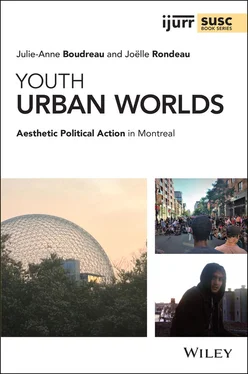In this book, our approach explicitly articulates urbanity and youthfulness to political action. Like the early Chicago School, we work with ethnography. Like the Birmingham Centre for Contemporary Cultural Studies, we adopt a critical perspective linking youthfulness and political action (although we do not necessarily frame this action in terms of resistance). Like the French sociologie de la jeunesse , we are concerned with understanding what it means, socially, to be young, as opposed to being ‘adult’. But we wish to explicitly spatialize this reflection. Doing so alongside racialized youths living in racialized neighbourhoods necessitates (as we will see in Chapter 2) that we pay critical attention to the effects of racial discourses, practices, and state apparatuses on experiences of youthfulness. The question for us is not so much: Why and how do young people transgress the adult norm or grow into socially functioning adults? Instead, articulating youthfulness, urbanity, and political action, we ask: Who can claim to be young? Who can assign youthfulness to a political subject? Under what and whose terms? What is youthfulness as a form of political action?
We find inspiration in the literature emerging from studies of youth and urbanity in the Global South. This literature is particularly insightful in theoretically articulating youthfulness and urbanity, perhaps because both are so much more visible in these Southern cities given the intensity of the urbanization process there and the inverted age pyramid in relation to the ageing population of the Global North. Of course, the urban context that inspired these studies is very different from that of Montreal. Nevertheless, if adapted to the specificities of the latter, the theoretical proposals emerging from these contexts are most useful for decentring the analysis.
Studying young trendsetters in Mexico City, Urteaga (2012) suggests seeing youthfulness as a position from which to experiment with cultural and social change . Youthfulness for her consists of a specific ‘way of being together’. Being together, for youth, is about opening spaces of fluxes and games in which they can constantly recreate their ways of being through aesthetic, a specific conception of work, ways of organizing themselves to work, new verbal and body languages, and forms of social conduct. In short, Urteaga emphasizes the idea of a youthful social and spatial position.
Simone’s (2005) work expands on this idea by emphasizing the mobile and fluid nature of this sociospatial position. Studying youth mobility cultures in Douala, he shows how circulation gives youth the opportunity to experiment through dispersion rather than confinement , thereby rejecting the enclosed idea of subcultures with clear boundaries. In the politically and economically unstable context of Douala, becoming somebody means being able to move around, to operate everywhere in the city rather than being known locally as the ‘son of Mr. X’. In this context, writes Simone (2005, p. 520), ‘disrespect for a confined sense of things, therefore, becomes a key element of self‐fashioning’. In Douala, being young means assembling various discordant temporalities and situations of potential informal work, because the present can no longer be considered a platform for the future . Youth life, in Douala, is a life of permanent circulation, rather than following the well‐known track of marriage and formal employment. Simone thus squarely rejects the French aspatialized perspective on the transition to adulthood.
Being young and mobile provides a very different vantage point from that of being married and employed, in Douala and elsewhere. This networked mode of spatial relations changes worldviews (and it is not exclusive to youth, even if it is perhaps more visible for them). The world becomes less linear, built from networks of significant places and collections of temporalities. A vantage point (Urteaga’s sociospatial position) not only provides a framework for reading the world, it also constructs a platform for fashioning oneself as a political subject. Bhabha (1994) explains clearly how travelling provokes a rupture in one’s identity, because being in a new place provokes feelings of estrangement; it displaces one’s identity; it changes one’s standpoint (in the proper sense of changing what we see and feel as we change where we stand). The more vantage points we experience, the more political subjectivity we develop. This entails discontinuous political ideas: we change more often what we think is the right political claim to make. We can more easily change ‘causes’, move across value systems and political influences. Political engagement becomes highly dependent on the various encounters we have along our many displacements. Allegiances are often only temporary.
This is what Bayat (2010) attempts to capture with the notion of a youth non‐movement, based on his analysis of young people’s resistance to the Iranian regime in the 1980s. Looking at almost invisible gestures such as the underground world of youth dancing parties and the informal market for prohibited music, he qualifies Teheran’s youth culture as a youth non‐movement. Instead of speaking of youth subcultures, Bayat prefers to speak in terms of youthfulness, to emphasize a political form and a way of life, instead of youth as an essentialized and biological category. What characterizes youths are youthful ‘ways of being, feeling, and carrying oneself (e.g. a greater tendency for experimentation, adventurism, idealism, autonomy, mobility, and change) that are associated with the sociological fact of “being young”’ (Bayat 2010, p. 118). Youthfulness, pursues Bayat (2010, p. 119), is an urban condition: ‘It is in modern cities that “young persons” turn into “youth”, by experiencing and developing a particular consciousness about being young, about youthfulness’.
The field of youth studies in the Global South explicitly articulates, theoretically and empirically, youthfulness as a mode of action, as a social position, as a set of mobile spaces and temporalities. Based on this work, we prefer to speak of youth worlds instead of subcultures or new social movements. We adopt Becker’s (1982) interactionist conception of the various worlds that compose social life. A world is always socially constructed and in constant transformation. Becker’s basic idea is that people’s worlds are constituted by what people do together. Even if his work was central to subcultural studies emerging out of the Chicago School, the concept of youth world can accommodate a much more porous spatiality.
For us, an urban world is constructed by and shapes youth perceptions of the broader world, as well as their interactions with other‐than‐human forces that people their everyday lives. Instead of defining their worlds as subsystems, alternative cultures, or recognizable urban scenes, we keep Becker’s interactionist focus, because it avoids structural and deterministic explanations of why people do what they do. 10 Youth urban worlds are formed through interactions with the spaces and artefacts of the city as much as with other people. In addition, following Nancy (1993), we suggest that worlds are characterized by specific sensory experience, by a shared space of commonality. What we are able to sense depends on our relations and exposure within and between worlds. Unlike urban scenes, however, many of the youth urban worlds we will describe in the following chapters are not easily identifiable, representable, or nameable. We could speak of the anarchist activist scene, the lifestyle sports scene, or the urban farming scene. But we cannot really speak of the racialized youth scene, and not all activists would identify with the anarchist scene. This is why we will speak more fluidly of youth urban worlds.
Читать дальше












